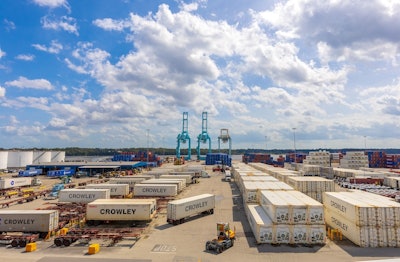
Editor's Note: The strike ended October 3 with the union accepting a tentative deal for a 62% wage increase spread over six years. For more about the strike's end, click here.
Editor's note: This story was up on October 3 with a statement from Acting Secretary of Labor Julie Su.
Tens of thousands of International Longshoremen’s Association workers have gone on strike for the first time since 1977, impacting all the major ports on the Atlantic and Gulf coasts. Negotiations for a new labor contract between ILA and shipping industry group United States Maritime Alliance failed to result in an agreement before the expiration of the previous six-year contract on September 30.
“We are now demanding $5 an hour increase in wages for each of the six years of a new ILA-USMX Master Contract,” said ILA President Harold Daggett. “Plus, we want absolute airtight language that there will be no automation or semi-automation, and we are demanding all Container Royalty monies go to the ILA.”
The strike is set to impact the importation of construction materials and equipment, possibly leading to increased wait times and prices. A report prior to the strike from construction solutions firm Gilbane estimated a one-week strike could create a backlog that would take four to six weeks to clear, and a two-week strike would extend the recovery period into 2025.
Strike Facts
CBS News reports 14 ports are closed: Baltimore; Boston; Charleston, South Carolina; Jacksonville, Florida; Miami; Houston; Mobile, Alabama; New Orleans; New York/New Jersey; Norfolk, Virginia; Philadelphia; Savannah, Georgia; Tampa; and Wilmington, Delaware. However, Supply Chain Dive recently reported certain ports have some terminals still open for operation, including Jacksonville.
Workers at West Coast ports are not on strike, as they are primarily represented by a different organization, the International Longshore and Warehouse Union.
Several construction industry and equipment manufacturing groups have called on President Joe Biden to intervene in the strike. But, according to various media reports, Biden has no intention of using the 1947 Taft-Harley Act, which allows him to intervene in strikes that create a national emergency.
In a statement issued October 1, Acting Secretary of Labor Julie Su said, "Over the last week and more, I have spent hours on the phone and in meetings with the parties urging them to find a way to reach a fair contract" and urged both parties to return to the negotiating table.
Impact on the Construction Industry
In a statement to Equipment World, Kristen Swearingen, Associated Builders and Contractors vice president of legislative & political affairs, said the construction industry cannot afford the price hikes and supply-chain delays the strike is forecast to cause.
“Associated Builders and Contractors urges President Joe Biden to invoke his powers under the Taft-Hartley Act to restore operations at the ports and bring parties to the negotiating table so a contract can be reached with the help of a federal mediator,” Swearingen said. “If the Biden-Harris administration is serious about rebuilding America – and maximizing hundreds of billions of dollars in taxpayer investments in infrastructure, clean energy and manufacturing – the construction industry simply cannot afford any more supply- chain disruptions and additional cost hikes on critical materials.
“The price of construction materials has already increased by 40% since February 2020, and there have been reports of widespread shortages of key construction materials. Coupled with the construction industry’s skilled-labor shortage topping half a million in 2024, these industry headwinds needlessly inflate the cost of federal and federally assisted construction projects and are exacerbated by this administration’s weak leadership and anti-competitive executive actions.”
Ken Simonson, chief economist at the Associated General Contractors of America, said he hasn’t heard yet of any impacts to the industry but theorized that if the strike goes on for a while, “We'll hear about some component nobody outside of the industry knew was sourced from abroad and is stuck on a ship.”
Looking at the potential impact on the construction equipment industry specifically, Associated Equipment Distributors President and CEO Brian P. McGuire said:
“AED is greatly concerned about the East and Gulf Coast port strike and its impact on equipment dealers, manufacturers, and our customers. Each day the ports are shut down costs the economy billions of dollars. The impact is disproportionately felt by small to medium-sized businesses, which dominate the equipment industry. Imports and exports are halted, delaying the delivery of equipment parts and components, and preventing farmers from selling their crops to overseas markets.”
The National Association of Manufacturers said more than 68% of all containerized exports and more than 56% of containerized imports flow through East and Gulf coasts' ports, representing an average daily trade value of more than $2.1 billion. Additionally, NAM estimates show the strike jeopardizes $2.1 billion in trade daily, and the total economic damage could reduce GDP by as much as $5 billion per day.
When asked how it thought the port strike might impact its business, Bobcat Public Relations Manager Nadine Erckenbrack said, “At this time, we have not had any major supply-chain impacts due to the East Coast and Gulf Coast closures. We will continue to work closely with our supply and shipping partners, monitoring the situation and adjusting our approach accordingly.”











